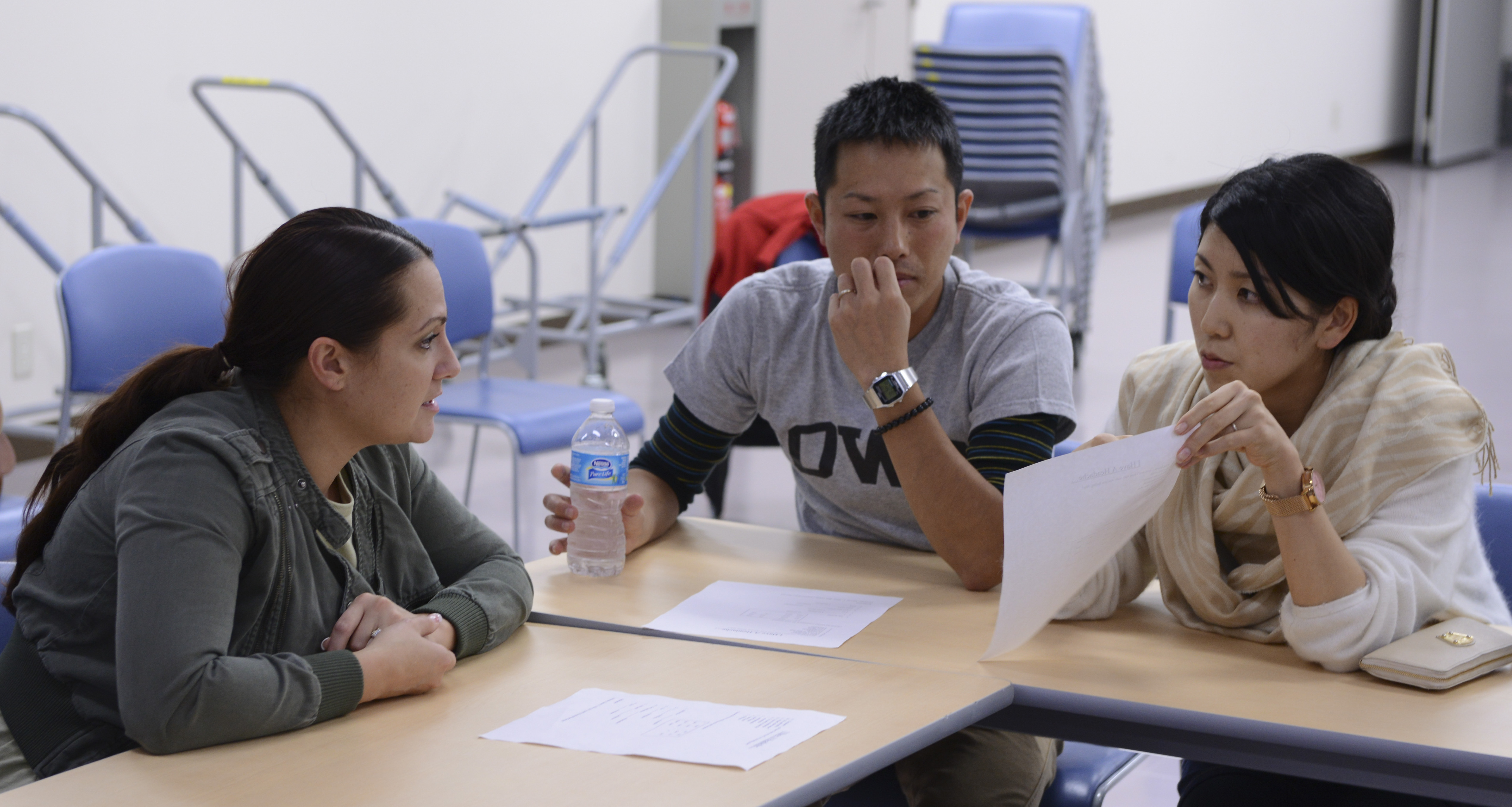
One of the most incredible, educational, and confidence-building things you can do is to live in another country for a while. Really getting to know another country’s culture, people, and ways of life can have a huge influence on your own opinions and life choices. One of the best ways to have this experience is to work abroad. There are many ways to do this – check out my post on 5 Ways to Work Abroad for some suggestions. This post is to detail one of the easiest and most fulfilling ways to live and work abroad: Teaching English as a Foreign Language.

Right after I graduated from university, I spent the summer in Prague getting certified as a TEFL instructor. I began looking for jobs and in a few months, I was packing to begin my contract as an English teacher in a private academy on the island of Jeju, 100 miles off the coast of South Korea. For just over a year, I lived on that small, volcanic island teaching my native language to Korean children ages four to fifteen. It was difficult for me at first, since the South Korean culture and language were so foreign to me, but I stuck with it, taught myself the Korean alphabet, made some Korean friends, traveled around, and experienced a lot of Korean traditions, food, and pastimes.

Overall, it was an experience I would definitely recommend. I found there were things I did that were great, things maybe I should have done, not done, or done differently, and things I saw others do to their benefit or detriment. From my personal experience and those of other English teachers I know, I’ve come up with a list of dos and don’ts for anyone planning or considering teaching English abroad.
DO get certified.
Being a “certified” English teacher can take several forms. You can get a full bachelor’s or master’s degree from a university or take a 6-8 week certification course from a trade school. It is not actually necessary to be certified in any way to get a job teaching English abroad. For many schools and programs, the only requirement is that you are a native speaker. Some places require you to have a bachelor’s degree in any subject – usually, this is in order to qualify for the work visa.

Even though you don’t need it, I recommend you at least take a short certification course. You will be more attractive to potential employers, will be able to get better positions more easily, and will be better prepared to do the actual teaching once you do get a job. I was an anthropology major at university with no prior teaching experience. While I am a language lover and more familiar with English grammar than some of my classmates, I was glad to get a feel for how to go about teaching.
The course allowed me to brush up on grammar topics, gave me ideas for how to conduct lessons, and provided practice lessons with real students. I felt a lot more confident and prepared to begin my job in South Korea for having done my certification course. Check for courses offered in your area or head abroad right away with an international course. You can even get certified online. i-to-i offers courses in a variety of places and online with different levels of training and time commitments.
DON’T be afraid to go somewhere you’ve never been.
It might seem daunting to pick up and move for a year to somewhere you’ve never even visited before. Looking for a job somewhere you have family roots, a friend or friends already, or have visited on vacation and enjoyed can sometimes feel easier. This is not an issue at all, by all means, pursue those avenues! But don’t limit yourself to exclusively places you feel some sense of comfort or familiarity with.

I had never been to South Korea before applying for jobs teaching English there. I applied for positions in both Korea and Japan, places known for having a lot of TEFL schools and some of the best salaries and benefits you can find. I had been to Japan before and had some familiarity with Japanese pop culture but felt no qualms about applying to and ultimately accepting a position in a place I had no knowledge of, South Korea. I felt it was more of an adventure and I ended up learning a lot. I am always looking for fresh and unique experiences. Go with your gut, but don’t be afraid to try somewhere completely new.
DO research the school/country/culture before accepting a position.
This is something I wish I had done. I saw the posting for a TEFL position on Jeju Island and was immediately drawn to the romance of living on an island. I did a quick google search and found it was a volcanic island, the honeymoon destination for South Korea. Just like that, I was hooked and immediately applied for the job there. I did a phone interview and accepted the position without looking up anything further about Jeju, about South Korea, or about the academy which was to be my employer. Thus, I had absolutely no idea what to expect when I arrived.

In some ways, this meant I was a blank slate, able to make my own impressions without being influenced by things I’d heard or read about. But I also think it really contributed to the difficulties I had for the first five or six months of my contract. Some quick research and preparation could have negated or improved some of the feelings of isolation and insecurity I had, any of the blunders I made trying to communicate, and I could have begun to fit in with the culture more quickly if I were aware of some of their common practices.

You don’t have to do a ton of preparation, but don’t go in completely blind, which I basically did. Research places you are considering applying to, the country, the town, the school. Before accepting a position, look into things enough to be confident it’s somewhere you would like to spend a significant amount of time. Then before you arrive, find out some basics about life there, try to learn a few words in the local language. You will always feel out of place at first, and a little preparation will help this.
DO embrace the local community & culture.
There’s no point in living and working in another country if you’re not going to participate. Find out about local events, festivals, pastimes, practices, and at least try out a few if not most of them. I regularly did my shopping at the local weekend market when I lived in Korea. I went up to Seoul for the annual Lotus Lantern Festival and joined my Korean friend at the local jjimjilbang (nude bathhouse) a few times. I bought a scooter so I could drive out the beaches and explore the island. If you embrace life in your temporary home, it really adds to the experience and what you get out of it.

DON’T skip out on your contract.
When I was taking my certification course and looking for jobs, I heard a lot about people not completing their contracts. Contracts are usually for 1 year with the potential to renew, though some might be 6 months or 2 years or some other amount of time. Especially in South Korea and Japan, where the benefits are better, people were using the job to get a free flight to the area and then leaving the school high and dry after a couple of weeks. Believe me, I know how tough a year-long commitment can be, especially in an unfamiliar country and situation, but it’s really rude to skip out on your employer. If there’s a big issue or family emergency, that’s something to discuss with your boss. It gives not only you but your fellow foreign teachers a bad name to just not show up for work one day or even to quit without notice.
DO know your needs & desires.
This one is a big one for my fellow introverts. It takes a lot more energy to function in a foreign place than a comfortable one. Take time to relax and get used to the place. You definitely want to go out and explore, but you don’t need to see everything all at once. Spread it out over your contract.

Also, it’s important to know what you are getting into in the first place. When I did my TEFL certification course in Prague, the sample classes we taught were to adult and older teenage students who were enthusiastic and wanted to learn. I didn’t really consider before starting my job in Korea how much easier that demographic is to teach than a bunch of little kids who don’t always want to attend extra classes with someone who doesn’t understand what they say. I enjoyed teaching but I hated disciplining. In hindsight, I should probably only have been looking at jobs teaching university students and adults. Not being a kids person, it was really tough for me until I got to know my students and the school well, and sometimes even then! Make sure you consider what you can handle both before accepting a position and once you actually begin working.
DO realize your influence on your students.
Teaching English is not just about grammar and vocabulary. You are also teaching your students about another culture, your home culture. You are their most immediate and tangible link to the English speaking world, so you have to remember you are an example. Keep in mind also that your perspective is not exactly the same as others in your own community, let alone other countries that speak English. Be sure to let them know when what you tell them is specific to your experience. It’s ok to say you don’t know something. Better that than giving false information. You don’t have to be the ultimate authority but realize how much you personally do influence your students.

DO travel the region.
Living and working abroad is a great way to get stuck in to a specific community in another country. You should definitely make efforts to be a part of your particular town or city, but also get out and take small trips around the region. When I lived on Jeju, I took two different weekend trips to Seoul and went up to the DMZ. I also flew to Japan for a long weekend. Especially if you are teaching somewhere far away or somewhere it might be difficult to get back to in future years, take advantage of your time in the region and travel to different areas of your host country and to the neighboring countries.
DO get to know your fellow teachers.
When you start a new job teaching English, your best resource is your fellow teachers – both the locals and your fellow expats. They can give you both perspectives, what it’s like to be a foreigner in your new home and what it’s like to be a local. They can give you tips on the best places to shop, what you should see and do, how the local transport works, all kinds of things! Plus, they can give you insight into your job, the school you are working at, your students, and how things work around there. Plus, they’ll probably have similar interests and can become lifelong friends.

DO seek support from fellow expats.
Especially in a culture that is very different from your own, homesickness can be a real problem. Sometimes you just want something familiar, something that reminds you of home. Expats tend to congregate around the common bond of being strangers in a strange place. There are often bars, restaurants, community places, and message boards or forums where you can get advice and comfort from your fellow foreigners, beyond your fellow foreign teachers. Check out if there are any expat organizations where you are. Don’t isolate yourself within this community, but definitely join in and lean on it when you need to.
DO learn at least some of the local language.
In retrospect, I think the biggest factor in the isolation I felt when I began teaching in Korea was the language. I had already traveled a lot and was used to not being able to understand most people around me, but I was not used to not even being able to read street signs, store names, bus timetables, etc.

With Korean using a completely different alphabet than I knew, it was so much more of a challenge to do even basic tasks out in the world. I finally identified the problem and taught myself to read the Korean alphabet, as well as speak a few basic words and phrases. Things got so much easier once I could read the signs around me, direct a cab driver, or ask a market vendor how much something cost. Not only is it cool to know at least some of the local language, but it can really improve the quality of your stay, help you meet and interact with locals more, and leave a better impression both on them and yourself.
DO take your job seriously.
Teaching English as a Foreign Language may be one of the easiest ways to live and work abroad, but it’s not all fun and games. Remember that this is an actual job and you will have to put in the work. It’s not a free vacation where you go in and chat with some local students a few hours a day then hit the beach. You have to plan lessons, issue and correct homework assignments and tests, and participate in activities at the school. You can’t slack off and go sightseeing every day. Treat this as any other job. Take it seriously and, of course, have fun in your time off.

Teaching English abroad can be such a great experience. Heeding these dos and don’ts will help you have the most positive time possible. Everyone’s experience is different. Some of these may not apply to you or apply more than others, but hopefully, there are some helpful points for TEFL instructors present and future. Happy teaching!
*This post includes one or more affiliate links. I earn a small commission (at no extra cost to you!) if you purchase a product or service through one of these links. Find out more here.*
Related Posts
- Become a Digital Nomad: 5 Jobs Anyone Can Do Anywhere
- Working Holiday Visas: A Beginner’s Guide
- 5 Travel Work Exchange Opportunities
- The Au Pair Experience: A guide to Working or Hosting
Want more from The Global Gadabout? Sign up for the newsletter and get access to exclusive printable freebies!
Pin this post for later!




